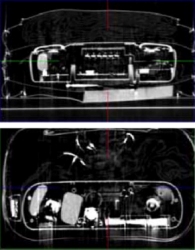Feb 4 2011
In an endeavor to ensure safer air travel after the tragedy of 9/11, David Castagno, a professor at the college of engineering and chairman ad interim of electrical and computer engineering, is developing a sensor that will detect explosive matter hidden in baggage at airports,
 DHS's Explosive Sensor
DHS's Explosive Sensor
Castañón says he is trying to add more sensors to the existing screening equipment at airports to spot behavioral patterns and transmit information in split seconds. This will need more advanced signal processing algorithms than those that exist at present. He is trying to work out the algorithm and other engineering that will go into the sensor.
In an initiative called Project ALERT: Awareness and Localization of Explosive Related Threats, introduced by the department of homeland security, Castañón along with Clem Karl, also a professor of engineering and computer engineering and others belonging to more than 15 educational institutions across the country, is endeavoring to develop a sensor that can be deployed in applications such as full body imaging and video surveillance.
The research focuses on issues such as mathematical problems prevalent in equipment and image processing. The work will involve matching the intelligence of hundreds of sensors and incorporating it all into one single sensor that will alert the authorities of the impending danger. An encouraging development is that video sensors have been developed recently to study behavioral patterns at traffic signals and prisons to warn of potential violence or accidents.